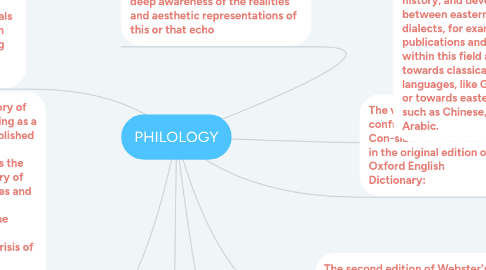PHILOLOGY
Зикен Кабдешоваにより

1. Philology is the study of language in written historical sources; it is a combination of literary criticism, history, and linguistics. It is more commonly defined as the study of literary texts and written records, the establishment of their authenticity and their original form, and the determination of their meaning. A person who pursues this kind of study is known as a philologist.
2. Philology is the study of language through the use of classic or historical texts. This field of study is named for the ancient Greek terms representing love and words, so that philology can be translated as a love of learning, or love of words. People who study philology are primarily concerned with historical language, rather than modern language development. Rather than focus on oral tradition, philology professionals concentrate on ancient written documents and texts, including both famous and everyday writings.
3. Integrating role of philology in modern society, torn by global contradictions and problems, is especially important. It is this area of knowledge that can help mankind overcome destructive processes, help to form a new type of thinking based on tolerance tolerance in relation to another. By its very nature, philology is humanistic, since it teaches to correctly understand the meaning of the text through dialogue. Regardless of what kind of text is a historical source or artistic monument. It requires deep knowledge not only in linguistics of literary criticism, history and psychology, cultural studies and art criticism, but also deep awareness of the realities and aesthetic representations of this or that echo
4. In Philology, the first history of Western humanistic learning as a connected whole ever published in English, James Turner tells the fascinating, forgotten story of how the study of languages and texts led to the modern humanities and the modern university. The humanities today face a crisis of relevance, if not of meaning and purpose. Understanding their common origins and what they still share has never been more urgent.
5. The word philology has long led a confused existence in English. Con-sider the two main definitions in the original edition of the Oxford English Dictionary:
5.1. Love of learning and literature; the study of literature, in a wide sense, including grammar,literary criticism and interpretation, the relation of literature and written records tohistory, etc. ; literary or classical scholarship; polite learning.Now rarein general sense.
6. The second edition of Webster's New Universal Unabridged Dictionary gives the appearance of greater clarity, but upon closer examination the appearance turns out to beamirage:
6.1. 1.originally, the love of learning and literature; study; scholarship. 2.thestudy of written records, especially literary texts, in order to determine their authenticity, meaning, etc. 3.linguistics: the current use.
7. Philologists typically choose to focus on a certain group of languages with similar origins. This is often necessary due to the vast differences in structure, history, and development between eastern and western dialects, for example. Many publications and study programs within this field are geared towards classical romance languages, like Greek and Latin, or towards eastern languages such as Chinese, Sanskrit, or Arabic.
8. The meaning of "love of learning and literature" was narrowed to "the study of the historical development of languages" (historical linguistics) in 19th-century usage of the term. Due to the rapid progress made in understanding sound laws and language change, the "golden age of philology" lasted throughout the 19th century, or "from Giacomo Leopardi and Friedrich Schlegel to Nietzsche".


